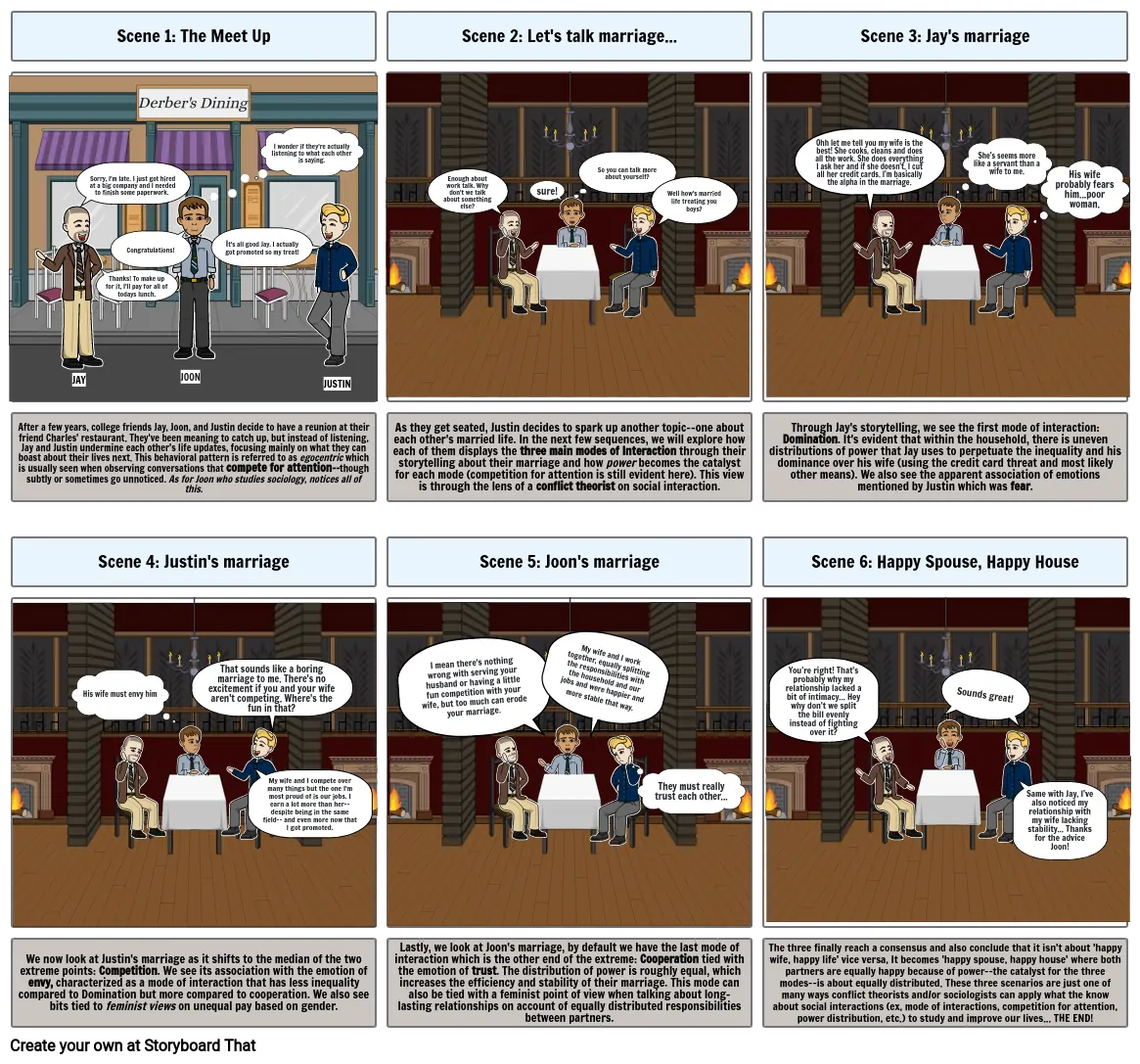Happy Wife, Happy Life

Storyboard Tekst
- Scene 1: The Meet Up
- JAY
- Sorry, I'm late. I just got hired at a big company and I needed to finish some paperwork.
- Thanks! To make up for it, I'll pay for all of todays lunch.
- Congratulations!
- Derber's Dining
- JOON
-
-
-
- I wonder if they're actually listening to what each other is saying.
-
- JUSTIN
- It's all good Jay. I actually got promoted so my treat!
- Scene 2: Let's talk marriage...
- Enough about work talk. Why don't we talk about something else?
- sure!
- So you can talk more about yourself?
- Well how's married life treating you boys?
- Scene 3: Jay's marriage
- Ohh let me tell you my wife is the best! She cooks, cleans and does all the work. She does everything I ask her and if she doesn't, I cut all her credit cards. I'm basically the alpha in the marriage.
- She's seems more like a servant than a wife to me.
- His wife probably fears him...poor woman.
- After a few years, college friends Jay, Joon, and Justin decide to have a reunion at their friend Charles' restaurant. They've been meaning to catch up, but instead of listening, Jay and Justin undermine each other's life updates, focusing mainly on what they can boast about their lives next. This behavioral pattern is referred to as egocentric which is usually seen when observing conversations that compete for attention--though subtly or sometimes go unnoticed. As for Joon who studies sociology, notices all of this.
- Scene 4: Justin's marriage
- His wife must envy him
- That sounds like a boring marriage to me. There's no excitement if you and your wife aren't competing. Where's the fun in that?
- As they get seated, Justin decides to spark up another topic--one about each other's married life. In the next few sequences, we will explore how each of them displays the three main modes of Interaction through their storytelling about their marriage and how power becomes the catalyst for each mode (competition for attention is still evident here). This view is through the lens of a conflict theorist on social interaction.
- Scene 5: Joon's marriage
- I mean there's nothing wrong with serving your husband or having a little fun competition with your wife, but too much can erode your marriage.
- My wife and I work together, equally splitting the responsibilities with the household and our jobs and were happier and more stable that way.
- Through Jay's storytelling, we see the first mode of interaction: Domination. It's evident that within the household, there is uneven distributions of power that Jay uses to perpetuate the inequality and his dominance over his wife (using the credit card threat and most likely other means). We also see the apparent association of emotions mentioned by Justin which was fear.
- Scene 6: Happy Spouse, Happy House
- You're right! That's probably why my relationship lacked a bit of intimacy... Hey why don't we split the bill evenly instead of fighting over it?
- Sounds great!
- We now look at Justin's marriage as it shifts to the median of the two extreme points: Competition. We see its association with the emotion of envy, characterized as a mode of interaction that has less inequality compared to Domination but more compared to cooperation. We also see bits tied to feminist views on unequal pay based on gender.
- My wife and I compete over many things but the one I'm most proud of is our jobs. I earn a lot more than her--despite being in the same field-- and even more now that I got promoted.
- Lastly, we look at Joon's marriage, by default we have the last mode of interaction which is the other end of the extreme: Cooperation tied with the emotion of trust. The distribution of power is roughly equal, which increases the efficiency and stability of their marriage. This mode can also be tied with a feminist point of view when talking about long-lasting relationships on account of equally distributed responsibilities between partners.
- They must really trust each other...
- The three finally reach a consensus and also conclude that it isn't about 'happy wife, happy life' vice versa, It becomes 'happy spouse, happy house' where both partners are equally happy because of power--the catalyst for the three modes--is about equally distributed. These three scenarios are just one of many ways conflict theorists and/or sociologists can apply what the know about social interactions (ex, mode of interactions, competition for attention, power distribution, etc.) to study and improve our lives... THE END!
- Same with Jay, I've also noticed my relationship with my wife lacking stability... Thanks for the advice Joon!
Izrađeno više od 30 milijuna scenarija

